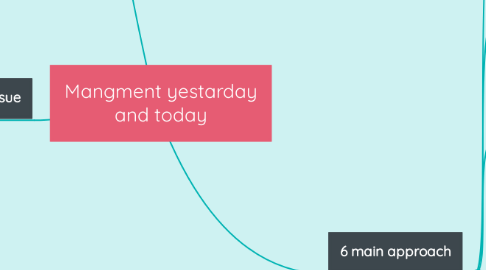Mangment yestarday and today
by caroline emad


1. Historical
1.1. Ancient management
1.2. Adam smith
1.3. Industrial revolution
2. 6 main approach
2.1. Contingency approach
2.2. Scientific managment
2.2.1. Fredrick Taylor
2.2.1.1. The best way
2.2.2. Frank and Lillian
2.2.2.1. Focused on time and motion study
2.2.2.2. Focused on industrial
2.3. General administrative theory
2.3.1. Henri fayol
2.3.1.1. Father of modern management
2.3.2. Focus more on the whole organization
2.4. Organization behavior
2.4.1. Max weber
2.4.1.1. Bureaucracy
2.4.1.1.1. Division of the labor
2.4.1.1.2. Authority hierarchy
2.4.1.1.3. Formal selection
2.4.1.1.4. Formal rules and regulations
2.4.1.1.5. Impersonality
2.4.1.1.6. Career orientation
2.5. Quantitative approach
2.5.1. Focuses on improving managerial decision
2.5.2. Hawthorne studies
2.5.2.1. Experimental findings
2.5.2.2. Research conclusion
2.6. Systems approach
2.6.1. Types of systems
2.6.1.1. Closed
2.6.1.2. Open
2.6.1.2.1. Input
2.6.1.2.2. Transformation process
2.6.1.2.3. Outputs

